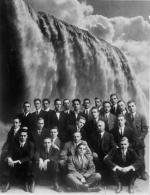Buchman knew that Blair Buck was not a man to be rushed, 'a type of person', as he observed later, 'with whom you used intelligent restraint and a nonchalant reserve'. 'I didn't ever talk to him about the things that meant most to me ... We talked about everything else under the sun.' They also went riding - a passion with Buchman since boyhood - in the green hills around the town.* Buchman's intentions were to make friends with Buck, and to involve him in the conversion of Bill Pickle.
(* Buchman owned a horse called Mary during the early years at Penn State. When upkeep became too expensive, he sold her and gave the proceeds to a poor student. '1 have just had the good news that it has helped him and his brother through college. They have built quite an extensive laundry service round Mary’ he wrote Woodcock on 7 November.)
Bill Pickle was the illegitimate son of a colonel, and had served in the Civil War as a drummer boy. He sported a 'furious walrus moustache', 'looked like a roaring pirate' and had often been heard to declare that he would like to stick a knife in Buchman's ribs. Buchman was rather nervous about him, and was alarmed when one day Buck pointed him out as they walked through town together, because he knew he must make a move towards him or lose Buck's respect. 'I've got a big nose,' Buchman related later, 'so when I walked up to Bill, I put my hand on his biceps so that if he did haul off, he wouldn't haul so hard. The thought flashed into my mind, "Give him your deepest message." "Bill," I said, "we've been praying for you." To my surprise all the fight went out of him. He pointed to a church tower.
'"See that church over there?" he said. "I was there when the cornerstone was laid. There's a penny of mine under it."'

The conversation ended in an invitation for Buchman and Buck to visit Bill, his wife and their twelve children in their unpainted house on what everyone called 'Pickle Hill'. Buchman found that they shared a love of horses, and they became friends. After some months he talked Bill into going to a student conference in Toronto. Bill said he would go if Buchman gave him his cherished beaver hat - a price Buchman promptly, if sadly, paid.
In Toronto, Bill decided to become a Christian, and, as he found writing difficult, asked Buchman to write out his letter of apology to his wife for the way he had treated her in the past. Thereafter, despite efforts by some of the students to lure him back, Bill stopped both bootlegging and drinking, which brought a marked decline in the overall campus consumption.
Dean Agee, who had paid Bill's fare to Toronto as a kind of 'dare', was much impressed by the difference in him, and Buck henceforth began to drop the words 'If there is a God ….'and to speak of One who 'had answered their prayer'. But there was a long way to go. One day, however, he told Buchman, 'There are lots of things I don't understand about the Bible and prayer and helping others.' 'Let's spend the summer vacation together,' replied Buchman, and during a couple of months, first on Mackinac Island in Michigan and then in Montana, where Buck's grandfather used to be Governor, and through the West, the younger man found the change he was seeking.11 Over the seven years at Penn State the hallmark of Buchman's work was his ability to bring such change into the lives of the most unlikely people. These included, besides those mentioned, Dick Harlow, who became football coach at Harvard; Henry Armstrong, one of the originators of the nickname 'Pure John'; Pete Weigal, who had stuffed his ears with cotton wool when forced to attend a meeting as horn-player in the college band, but became interested after the cotton wool fell out during an especially lively serenade; the football captain, Larry Vorhis; an athlete, Pete Johnson; and 'Pop' Golden, the tough football coach, whose dissipated life had affected generations of students. With most the alteration was lasting: Harlow introduced Buchman when he spoke at Colgate University some years later; Weigal succeeded Buchman as YMCA Secretary when he left Penn State; Blair Buck became a pioneer of black education in the South at Hampton Institute in Virginia and was closely in touch with Buchman all his life; Dean and Mrs Agee corresponded with him for many years; Armstrong invited Buchman to his home in 1931; and Mrs Pete Johnson came to Buchman's eightieth birthday party in 1958, her husband's factory having sent a gift of tiles to the American centre of Buchman's work. 'Pop' Golden's influence became, in Buchman's opinion, more important than that of a dozen preachers and, for whatever reason, the football team won 26 games and lost only two in the four years after his change.
37
Photo: Buchman with a group of Penn State students, and (on his left) Bill Pickle, the ex-bootlegger.
©Buchman Archive/MRA Productions